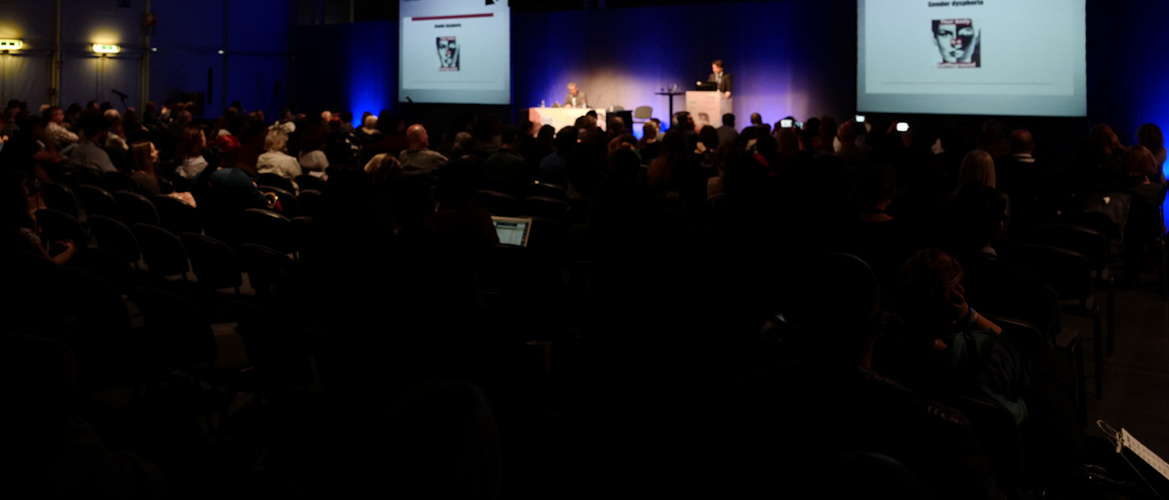
Choose a channel
Check out the different Progress in Mind content channels.

Progress in Mind


Gender dysphoria was a central topic at the EPA 2017 symposium on love, sex and psychiatry. We were also treated to a poetic description of the nature of love, and its experience and expression in depression and schizophrenia.
Prof Otto Doerr-Zegers, University of Chile and University Diego Portales, Chile, described the ideal expression of love as that of conceding or giving - "giving space or rather letting the things be in their respective spatiality". An English translation of Rainer Maria Rilke's German version of Elizabeth Barrett Browning's sonnet Number 7 is "The names: country, heaven are changed away. Only where you are, a place is born". Prof Doerr-Zegers explained that this means that in love, there is no displacement of the other but rather creation of a new space - "precisely there where you are".
But this spatiality of love is different in schizophrenia. Patients have great fear of proximity in relationships. The other person, be it a relative, friend or partner, is kept at a distance through delusions, behaviors and autism. These individuals are not able to merge with the other in what was described by Rilke as the "embrace of eternity". Closeness in relationships can also contribute to triggering situations of acute episodes. Prof Doerr-Zegers described the daily space of a person with schizophrenia, even outside of acute episodes, as an empty space. "The world ceases being a home", he noted.
The world ceases being a home
In depression, the spatiality of love is also different. People with depression struggle to cope with the distance of those they love. The most important triggering situations are caused by separation or loss. They may have a tendency to cling to people and objects, and not to give or concede space to the other. Prof Doerr-Zegers referred to a quote by Rilke: "… for this is wrong, if anything is wrong: not to enlarge the freedom of love".
Prof Giovanni Castellini, University of Florence, Italy, explained that the word 'gender' originally related to a person belonging to a category of individuals. The Latin 'gens' referred to Roman families. 'Gender identity' - the subjective experience of membership to a gender (Money 1971) - is something that most of us take for granted, Prof Castellini told us. This is not the case for everyone. Dysphoria for one's gender, as defined by the American Psychiatric Association (2013), is "the distress that may accompany the incongruence between one's experienced or expressed gender and one's assigned gender".
'Gender identity' - the subjective experience of membership to a gender (Money 1971) - is something that most of us take for granted
Prof Castellini presented a meta-analysis of prevalence studies in transsexualism (Arcelus 2015). Out of 21 studies, 12 had sufficient data for meta-analysis. The prevalence of transsexualism was 4.6 in 100,000 people overall - 6.8 and 2.6 for trans women and men, respectively. The reported prevalence has increased over the past 50 years.
Stigma is still a huge problem. A survey in the Netherlands reported that 42% of transgender individuals had experienced negative reactions - often in public (38%) and at work or school (21%) (Keuzenkamp 2012). In the USA, a study of 6,450 transgender people reported that 47% had a poor job outcome and 15% of students dropped out of school because of harassment (Grant 2011).
Treatments may allow for body modifications, and can have extraordinary effects on quality of life. Prof Castellini also noted that the physical, anatomical body is not the only source of suffering for people experiencing gender dysphoria - it is also a consequence of reactions from family, friends and society.
Prof Thomas Steensma, University Medical Center, the Netherlands, works with children and adolescents struggling with gender dysphoria. He described one of his 8 year old patients, who drew how they felt about themselves as pink on the outside and blue inside - a girl on the outside but a boy on the inside. He emphasized that gender role behavior should not be confused with gender identity. Also, not all children with gender dysphoria go on to experience this as adolescents. It has been reported that approximately 80% are 'desisters'. The crucial period for change is between 10 and 13 years of age. He does not promote medical interventions in children, but rather a time of education and keeping the space to explore as open as possible.
A girl on the outside but a boy on the inside.
Since the 1990's, early gender reassignment has begun at 16 to 18 years of age. Prof Steensma presented his research on the psychological outcome of 55 young adults after puberty suppression and gender reassignment. Patients were assessed one year after sex reassignment surgery. This is the only follow-up study on medical treatment in adolescents with gender dysphoria. None of the patients reported feeling regret. More information is needed from long-term follow-up studies.
Our correspondent’s highlights from the symposium are meant as a fair representation of the scientific content presented. The views and opinions expressed on this page do not necessarily reflect those of Lundbeck.